Banff wages slip behind comparable mountain towns, assessment finds
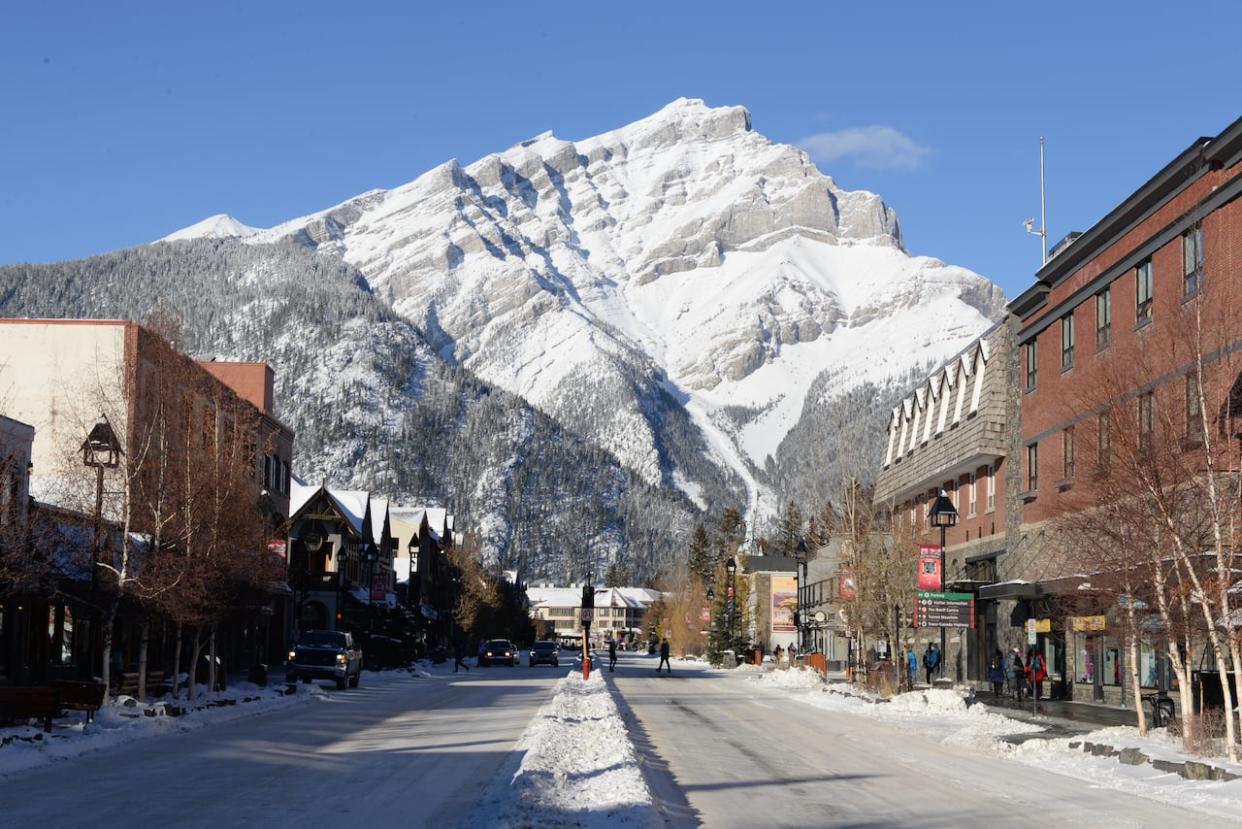
When it comes to pay, Banff residents are behind other mountain communities in Western Canada.
The Town of Banff checks on quality of life measures every five years, and administrators recently presented their report.
Among pages of statistics, sentiments and findings, a comparison to tax filer earnings in Whistler, Revelstoke, Jasper, Fernie and Canmore revealed that Banff was dead last.
The median family income in Banff for 2021 grew only nine per cent over five years compared to Whistler's 28.5 per cent growth.
Coun. Hugh Pettigrew did some quick math at a council meeting last week, calculating that nearly half of the town's tax filers reported earning less than $40,000 a year.
The assessment itself reports that 75 per cent of residents make $60,000 or less a year.
"How do we look at that? Because the cost of living is high and I don't know how to deal with this number," Pettigrew said. "Do we have a wage issue?"
Alison Gerrits, the town's director of community services, told him Banffites have lower wages than residents of comparable communities, and those wages over time aren't keeping pace with inflation.
"Those are statements of fact," Gerrits said.
The report is prepared every five years, in-house, by the Town of Banff. The assessment has two independent sections: a quantitative look at the data and a qualitative section where information comes from community conversations.
For the 2023 report, data came from both the federal census and 2021 tax filer data produced by Statistics Canada.
Wages are something the town will watch.
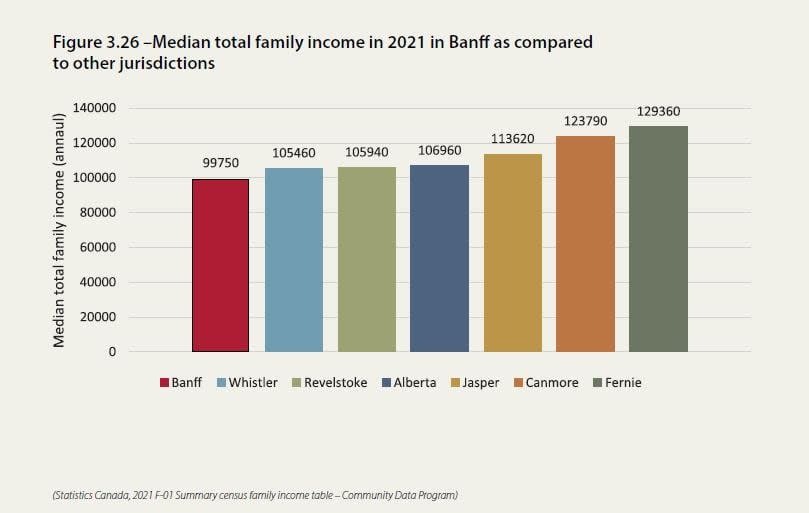
According to data from Statistics Canada, Banff lags behind other comparable communities when it comes to median total family income. (Town of Banff)
In an interview, Gerrits said Banff's wages have always ebbed and flowed in these assessments. The town has done four so far, so she has years of data to look back on.
"If I look at the last three iterations, we had a stalled growth, an increase in growth and we seem to be in a stall again," Gerrits said.
The next tax filer data set could show if this is part of that swaying trend, or if it's new and wages are splitting off from the pack and falling behind.
Banff has always been a unique place, as Wanda Bogdane with the Banff Lake Louise Hospitality Association points out.
Typically, the town likes to compare itself to Jasper and Whistler, two communities with similar economies — but not quite the same limitations.
Town of Banff exists for tourism
"The National Park Act restricts the types of economic activity within the townsite," Bogdane said. "It is the only municipality to have this extent of a mandated economic restriction that we know of."
Tourism industry wages, she said, skew lower.
She said Jasper has some diversification, while Whistler's economy is more diversified and flexible. Fernie, she points out, is part of the Elk Valley corridor, with some residents in the forestry and mining industries.
Then, there's the seasonality of Banff.
"Most of the year, the destination is not at full capacity, which means fewer hours for workers. This matters when comparing Banff to communities," Bogdane said.
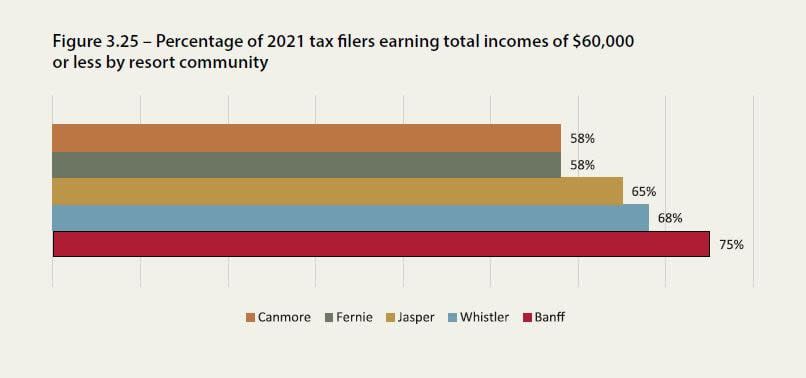
A majority of tax filers in Banff earn $60,000 or less. (Town of Banff)
Making a life in a resort town, Banffite Jessia Arsenio notes, isn't just about how much cash you can earn. Other pressures pile up. Some people get to a point in life where they think about starting a family or want different career opportunities.
"There's a lot of people with a very similar sense of purpose and drive that come here," Arsenio said. "As soon as you start wondering about cool and normal things like owning property or, you know, saving meaningfully for retirement, you start thinking, 'Well, am I actually going to be able to do that here?'"
After more than six years living in Banff, that's something Arsenio is grappling with.
When a wave of people leave, the cycle starts again, with more newcomers eager to come work in Banff and have that small mountain town experience.
For Caitlin Laurent, the call to live in Banff is so strong that she came all the way from Australia to experience the Rockies. It's not a rare choice. Aussie accents have become part of the Banff charm.
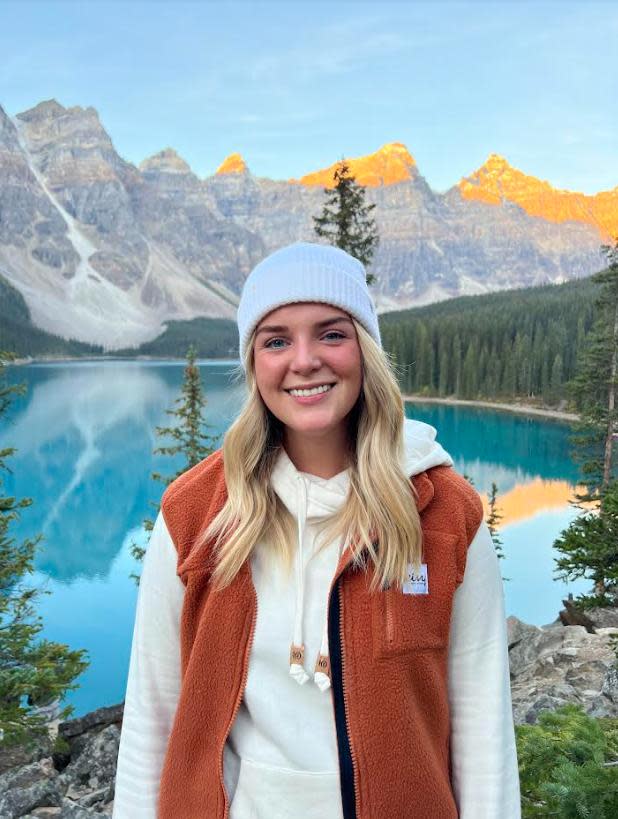
Caitlin Laurent moved to Banff from Australia, and has been working in the tourism industry for a number of years. (Tristan Knee)
"I liked that it was in the national park. It was more regulated. It felt more remote and peaceful," Laurent said. "To me, Whistler feels a lot more commercialized."
After a few years in town, she's realized the struggles, too. When Laurent and her partner moved out of staff accommodation, they couldn't find somewhere to land, which meant living in a friend's living room for a couple of months.
Now they have a place of their own to rent, sort of.
"It's me and my partner and we share with one other person — we are quite fortunate, " Laurent said. "We would prefer just for it to be the two of us."
Even if the couple could find a place of their own, they may struggle to afford it. Laurent's server job pays the rent; for any extra expense, she relies on tips.
"We don't have consistent hours, we don't have consistent income. We're just relying on the people who sit at our tables so we can do things," she said.
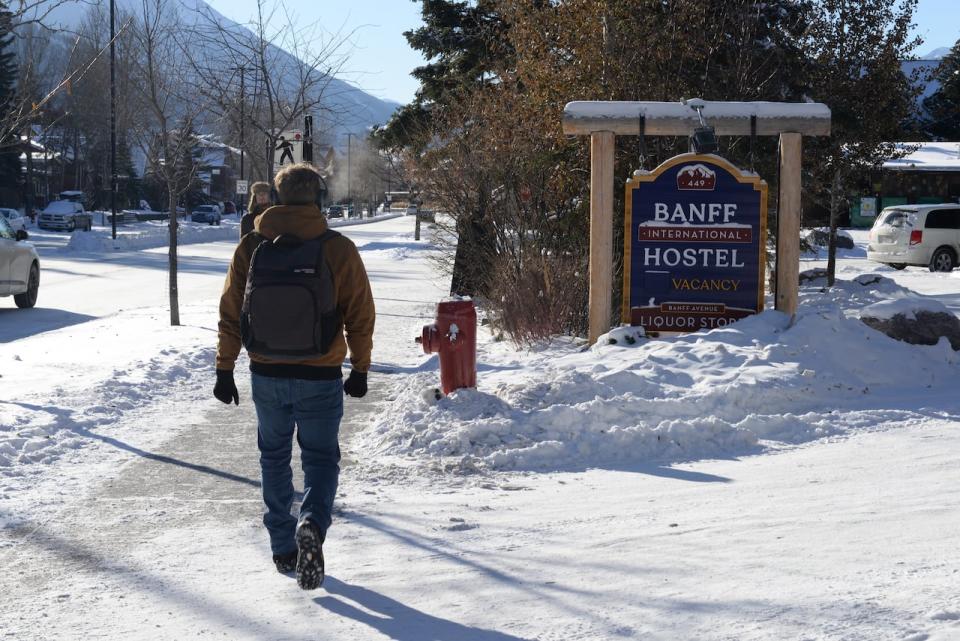
Housing has always been an issue in the Bow Valley, but pandemic impacts have changed the landscape. (Helen Pike/CBC)
Overcrowding has subsided a bit since the pandemic, but Banff and Whistler rank higher than Jasper, and Canmore beat out provincial and national figures for those living in crowded conditions as defined by the National Occupancy Standard.
The way Arsenio describes it, the pandemic triggered an avalanche of problems. Shifts to people's comfort living in crowded homes, worker availability with travel restrictions, and an affordability crisis have come down hard on some residents.
"People didn't really want to go back to super dense housing," Arsenio said. "One thing that I've seen lately that I've not seen, you know, nearly on the scale as I did previously, was people being displaced."
Once you're out looking for a home, the competition can be relentless.
Laurent hears from people across the world through her content creation side hustle.
People reach out on her YouTube channel looking for advice: how to find jobs and places to live. Laurent feels things are getting worse, especially when she thinks about the number of people in her immediate network living in the town's hostel.
Programs and job perks help stretch wages
Bogdane said housing has become a big part of compensation. Even though businesses don't open up shop in town to become landlords, it's been a necessity.
"They understand the importance of investing in housing for their team members as it offers stability," she said.
Every perk, Bogdane said, helps stretch people's wages, whether that's transportation to work, meals, ski passes, tips or bonuses.
And that's not just on the shoulder of businesses in Banff. Gerrits said the town has programs in place that give residents a leg up. They include free transit for locals, free recreational programming and other supports.
"You can't ignore the other side of the equation, which is that housing is a challenge," Gerrits said. "By far, housing was cited as the most significant challenge by a significant margin."

